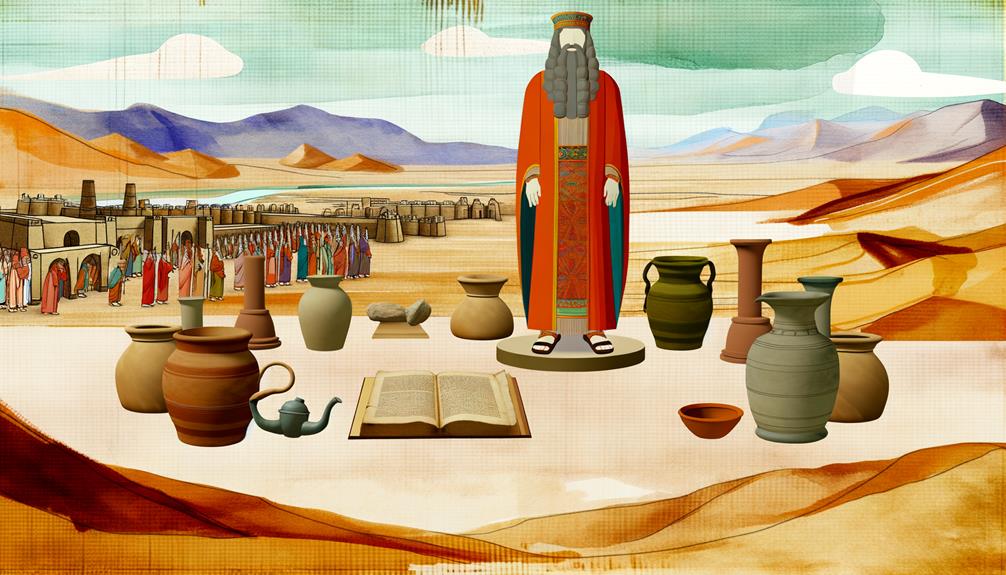Agag Meaning in the Bible: A Symbol of Kingship
In the Bible, Agag is particularly recognized as the king of the Amalekites, a tribe historically antagonistic to the Israelites. His narrative, particularly in 1 Samuel, symbolizes the enduring conflict between divine mandates and human disobedience.
Agag’s fate, decreed by the prophet Samuel, underscores the severity of divine justice and serves as a stark reminder of the consequences for defying God’s commands. This story encapsulates broader theological themes such as divine retribution, moral integrity in leadership, and the enduring enmity between the Israelites and their adversaries.
Exploring Agag’s significance reveals profound insights into these biblical themes and their implications.

Agag Meaning in the Bible: Significance and Symbolism
| Aspect | Details |
|---|---|
| Term | Agag |
| Meaning in the Bible | A title or name associated with the kings of the Amalekites, representing opposition and enmity toward Israel. |
| Historical Background | Agag is mentioned as a king of the Amalekites, a tribe often in conflict with Israel. King Saul’s failure to obey God’s command to destroy Agag led to significant consequences for Israel. |
| Symbolic Significance | Represents defiance against God’s will and judgment. Agag’s story highlights the importance of obedience and the consequences of disobedience. |
| Key Mentions in the Bible | – 1 Samuel 15:8-33: King Saul spares Agag, disobeying God’s command, leading to Samuel executing Agag. – Numbers 24:7: A prophecy mentions Agag symbolically, referring to the dominance of Israel over its enemies. |
| Lessons from Agag’s Story | – The importance of complete obedience to God’s commands. – A reminder of God’s justice and sovereignty in dealing with rebellion. |
Historical Context of Agag

The historical context of Agag is intricately tied to the narrative of the Amalekites, a nomadic tribe frequently mentioned in the Old Scriptures.
Agag is specifically referenced as a king of the Amalekites, embodying the longstanding enmity between his people and the Israelites. This historical backdrop is essential for understanding Agag’s role, particularly his appearance in the biblical accounts related to Saul and Samuel.
The Amalekites were recurrent adversaries of Israel, and their conflicts are documented as significant episodes in Israelite history. Understanding Agag within this milieu necessitates an examination of the sociopolitical and religious dynamics of the time, which are captured in various scriptural texts.
These sources provide a composite view of Agag’s symbolic and literal significance.
Agag and the Amalekites

Agag, as a prominent figure among the Amalekites, holds substantial biblical significance, particularly in the context of the Israelites’ historical conflicts.
His role encapsulates the enduring enmity between the Amalekites and Israelites, reflecting broader themes of divine justice and leadership in the scriptures.
Examining the historical and theological implications of Agag’s interactions with the Israelites provides critical insights into the narrative and moral framework of the biblical text. Agag, the king of the Amalekites, symbolizes the enduring conflict between Israel and its enemies, illustrating the themes of divine justice and obedience to God’s commandments. His interactions with the Israelites underscore the importance of decisive action against evil, as commanded by God. Understanding Agag’s role within this context also sheds light on the aida biblical meaning and significance, revealing the deeper lessons about faith, leadership, and the consequences of disobedience to divine authority.
Historical Context of Agag
Frequently, the historical context of Agag is intertwined with the narrative of the Amalekites, a nomadic tribe often portrayed as adversaries of ancient Israel in biblical accounts.
Agag, a title used for Amalekite kings, signifies a prominent leadership role within this tribal community. The Amalekites, mentioned from the time of Abraham through to the reign of King Saul, were noted for their persistent hostility towards the Israelites. Their conflicts are chronicled in various texts, including Exodus and 1 Samuel, illustrating a long-standing enmity.
Agag’s specific historical context is primarily illuminated through his interactions with Saul, where he embodies the archetypal enemy of Israel. This enmity is not merely militaristic but symbolically represents the ongoing struggle between Israel and its foes.
Agag’s Biblical Significance
Understanding Agag‘s biblical significance necessitates an exploration of his role as a symbol of the enduring conflict between the Israelites and the Amalekites.
Agag, the Amalekite king, epitomizes the persistent enmity that the Amalekites harbored against Israel, as documented in various scriptural accounts. His presence underscores the theological and moral dimensions of Israelite history, reflecting the broader narrative of divine justice and retribution.
Agag’s fate, as decreed by the prophet Samuel, illustrates the gravity of defying divine commandments. The Amalekites, through Agag, are depicted as embodying opposition to God’s chosen people, thereby becoming a focal point for understanding the dynamics of divine-human interaction and the perpetual struggle between faithfulness and rebellion in biblical tradition.
Conflict With Israelites
The conflict between the Israelites and the Amalekites, epitomized by the figure of King Agag, serves as a pivotal theme in biblical narratives, highlighting the recurring hostilities and theological implications embedded in their historical interactions.
The Amalekites, descendants of Esau, are recurrent adversaries of Israel, and Agag, their king, symbolizes their persistent opposition.
This enmity reaches a critical juncture in 1 Samuel 15, where King Saul’s failure to fully execute God’s command to annihilate the Amalekites, sparing Agag, underscores themes of divine justice and human disobedience.
Samuel’s subsequent execution of Agag is a stark reminder of the seriousness with which divine edicts were to be followed, reflecting broader theological motifs of judgment, obedience, and the eradication of evil.
Agag in the Book of Samuel

In the Book of Samuel, Agag is depicted as the Amalekite king whose capture and subsequent execution by the prophet Samuel highlight a significant moment of divine judgment and obedience in Israelite history.
This episode underscores the critical importance of adherence to God’s commands, as conveyed through the prophet.
Agag’s fate serves as a poignant reminder of the consequences of disobedience, both for the Amalekites and for the Israelites.
Samuel’s actions in executing Agag illustrate the necessity of fulfilling divine instructions completely, reinforcing the theological theme that partial obedience equates to disobedience.
This narrative segment also reflects the broader struggle between Israel and its enemies, encapsulating themes of divine justice and the sovereignty of God’s will in Israelite tradition.
Agag’s Encounter With Saul

Agag’s encounter with Saul marks a pivotal moment in the narrative, revealing the complexities of Saul’s leadership and his partial obedience to God’s command as delivered by the prophet Samuel. Saul’s decision to spare Agag, the Amalekite king, directly contravened God’s explicit instructions to annihilate the Amalekites. This act of disobedience underscores several critical dimensions:
Divine Command: Saul’s failure to execute God’s command highlights his compromised faithfulness.
Prophetic Judgment: Samuel’s subsequent condemnation illustrates the weight of prophetic authority.
Leadership Flaws: Saul’s actions expose significant weaknesses in his leadership.
Moral Ambiguity: The sparing of Agag raises ethical questions about mercy versus justice.
Consequences: This episode foreshadows Saul’s eventual downfall and loss of kingship.
These elements collectively underscore the narrative’s theological and moral complexity.
Symbolism of Agag’s Name

The symbolism of Agag’s name within the biblical narrative invites an exploration of its historical context, its portrayal in scripture, and the various interpretations that have emerged over time.
By examining Agag within the framework of ancient Near Eastern traditions and his role in the biblical text, one can uncover deeper thematic elements that his character represents.
Such an analysis offers insights into the broader theological and moral lessons conveyed through his story.
Historical Context of Agag
Understanding the historical context of Agag requires an examination of the symbolic implications embedded in his name within biblical texts. Agag, referenced as a king of the Amalekites, holds a name that carries substantial weight in biblical literature. This name is synonymous with enduring enmity and opposition to the Israelites.
The symbolic implications of Agag’s name can be delineated through several key associations:
- Hostility: Represents continual conflict with Israel.
- Judgment: Embodies divine retribution.
- Leadership: Symbolizes a potent and oppositional rulership.
- Legacy: Conveys a historical lineage of enmity.
Thus, understanding Agag’s name is essential to comprehending his role within the historical and theological framework.
Agag in Biblical Narrative
Examining the biblical narrative, the name Agag emerges as a profound symbol of antagonism and divine judgment interwoven throughout the scriptures.
Agag, a title referring to Amalekite kings, represents persistent opposition to Israel and God’s divine will. The recurring presence of Agag highlights the enduring conflict between the Israelites and the Amalekites, epitomizing the struggle between good and evil.
Agag’s ultimate defeat by the prophet Samuel (1 Samuel 15:33) underscores the biblical theme of divine retribution against those who defy God’s commandments.
This narrative placement of Agag serves not merely as a historical account but as a theological construct, reflecting broader motifs of divine justice and moral order within the biblical tradition.
Interpretations of Agag’s Symbolism
Agag’s name, often interpreted as a metonym for the Amalekite kings, carries significant symbolic weight within biblical literature, serving as a representation of defiance against divine authority and the perpetual enmity between the descendants of Esau and Israel. This symbolism encapsulates several profound elements:
- Defiance against God: Agag’s resistance epitomizes rebellion against divine commandments.
- Perpetual conflict: The enmity between Amalekites and Israelites underscores ongoing strife.
- Moral failure: Saul’s sparing of Agag signifies a lapse in executing divine justice.
- Divine retribution: Agag’s eventual demise exemplifies inevitable divine judgment.
These symbolic interpretations enhance our understanding of Agag’s role in biblical history.
Theological Implications of Agag

The theological implications of Agag, the Amalekite king mentioned in the Bible, are profound, as they reflect broader themes of divine justice, covenantal fidelity, and the moral responsibilities of leadership within the biblical narrative.
Agag’s story underscores the importance of obedience to divine mandates, as seen in Saul’s failure to fully execute God’s command, leading to his rejection as king. This narrative illustrates the consequences of disobedience and the necessity of upholding divine justice.
Additionally, Agag represents the enduring enmity between Israel and Amalek, highlighting the continuous struggle against forces opposing God’s covenantal promises.
Consequently, Agag’s account serves as a theological lesson on the gravity of divine commands and the imperative of moral integrity in leadership.
Conclusion
Agag’s role in biblical texts reveals rich historical, theological, and symbolic significance. His association with the Amalekites underscores ancient animosities, while his depiction in the Book of Samuel delineates divine disapproval of disobedience.
Agag’s encounter with Saul encapsulates the consequences of incomplete compliance.
Symbolically, Agag’s name signifies adversarial attributes, reflecting broader biblical themes of conflict and judgment.
The theological implications of Agag’s narrative emphasize the enduring ethos of divine justice and the perils of partiality in obedience.






